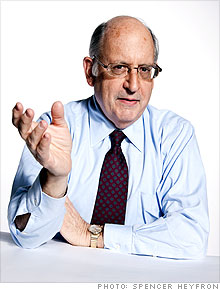FORTUNE -- It's human nature to want to pay as little in taxes as possible, and to have someone else pick up the tab for the taxes we do have to pay. For most of us, alas, that's just a fantasy. But to the folks who run America's biggest and most prominent buyout funds, it's reality.
Sounds like I'm being unfair, doesn't it? But watch as I combine a recent filing by KKR Co. LP (KKR) with the debate in Washington about how to tax buyout barons' piece of their investors' profits.

The KKR filing, part of its recent move to have its partnership units traded on the New York Stock Exchange rather than on an obscure British exchange in Guernsey, shows how the investing public subsidizes the insiders' tax bills.
It works like this: KKR (formerly Kohlberg Kravis Roberts) has set up a corporate subsidiary that can increase the stated value of its assets based on the gain realized by insiders who sell some or all of their stake in the company. This written-up value is tax-deductible to the corporation over 15 years, with the tax savings flowing through to the partnership. (It's what tax techies call a 754 election.)
This nifty little move reduces the partnership's taxes. Does KKR distribute those savings to its owners equally? Nope. It passes on 85% of its savings to the selling insiders, even if it has to borrow the cash to make the payments. (I should say "will pass on"; insiders haven't yet sold any units.)
These tax-sharing payments are serious money. Even if you assume that only half the insiders' gains turn into tax deductions for the firm -- KKR declined comment, so this is my best guess -- the payments about equal the cost of the insiders' taxes. Pretty sweet.
Here's the math. Say Henry Kravis sells $1 million of units, generating $1 million of taxable income. He pays $150,000 in federal taxes, assuming all his proceeds are long-term capital gains. Let's say half that gain -- $500,000 -- becomes deductible to KKR's corporation at a 35% rate. This saves KKR $175,000 in taxes over 15 years.
Of this, $149,000 -- the aforementioned 85% -- goes to Kravis. The payments to Kravis beget further deductions for KKR, begetting further payments to Kravis, and so on. You end up with about $206,000 in payments to Kravis. Adjust for the fact that they're spread over 15 years, and they're equivalent to about $150,000 today. So the public firm would be giving Kravis tax-sharing payments about equivalent to his tax bill, assuming, as I said before, that all his profits are capital gains. (KKR declined to discuss Kravis's tax situation.) Kravis would have to pay income tax (at ordinary rates) on his tax-sharing payments, poor baby. But he'd still be getting a helluva deal on his gain, compared with what regular folks pay.
To be fair, this is an established (albeit public-investor-unfriendly) technique. Blackstone (BX), as I wrote three years ago, has a similar deal, as do Pzena (PZN), Och-Ziff (OZM), DreamWorks Animation (DWA), and Lazard (LAZ). Tax expert Robert Willens of Robert Willens LLC, who helped me with some of the math, says this tax goodie shows how the real world works. "The thesis," he told me, "is that the partnership's tax savings wouldn't increase the price people were willing to pay for the units, and the tax-sharing agreements wouldn't decrease the prices people were willing to pay for the units. So the insiders might as well keep the bulk of the savings."
However, even though this game is both legal and disclosed to investors, it has a stiff -- and nonvisible -- cost attached. It enraged congressional representatives and staffers, helping spur the move to raise taxes on the buyout boys' share of their investors' profits, known as the carry. The carry is currently taxed at the low long-term capital-gains rate, provided that the investors' profits are long term. In a rational world the carry would be treated as a fully taxable incentive fee, which is what it is.
When the dust finally settles, the buyout boys will probably pay more taxes on their carry (and maybe on sales of their piece of the firm) than they do now -- but will still pay a lower overall rate than upper-middle-income people pay on similar income. And upper-middle-income people don't have publicly traded partnerships sending them tax-sharing payments. For us, then, having low taxes and getting outside help in paying them is only a dream. For the buyout boys, it's a dream come true. ![]()






| Company | Price | Change | % Change |
|---|---|---|---|
| Ford Motor Co | 8.29 | 0.05 | 0.61% |
| Advanced Micro Devic... | 54.59 | 0.70 | 1.30% |
| Cisco Systems Inc | 47.49 | -2.44 | -4.89% |
| General Electric Co | 13.00 | -0.16 | -1.22% |
| Kraft Heinz Co | 27.84 | -2.20 | -7.32% |
| Index | Last | Change | % Change |
|---|---|---|---|
| Dow | 32,627.97 | -234.33 | -0.71% |
| Nasdaq | 13,215.24 | 99.07 | 0.76% |
| S&P 500 | 3,913.10 | -2.36 | -0.06% |
| Treasuries | 1.73 | 0.00 | 0.12% |
|
Bankrupt toy retailer tells bankruptcy court it is looking at possibly reviving the Toys 'R' Us and Babies 'R' Us brands. More |
Land O'Lakes CEO Beth Ford charts her career path, from her first job to becoming the first openly gay CEO at a Fortune 500 company in an interview with CNN's Boss Files. More |
Honda and General Motors are creating a new generation of fully autonomous vehicles. More |
In 1998, Ntsiki Biyela won a scholarship to study wine making. Now she's about to launch her own brand. More |
Whether you hedge inflation or look for a return that outpaces inflation, here's how to prepare. More |